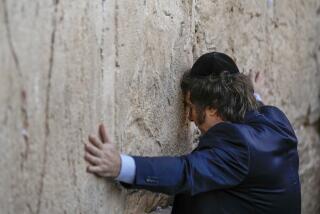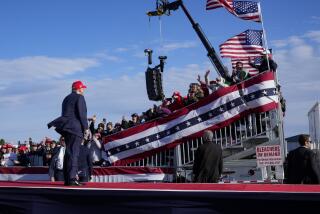Mandela Defends Ties to Arafat, Kadafi : Israel: The ANC official doesn’t question the Jewish state’s right to exist but disputes its boundaries. He says he stays out of other countries’ internal affairs.
- Share via
NEW YORK — Nelson Mandela stoutly defended his ties with Palestine Liberation Organization Chairman Yasser Arafat on Thursday, chiding those who he said had tried to misconstrue his position on Israel and saying that “we have no time to look into the internal affairs of other countries.”
Mandela was questioned on the matter extensively during a “town meeting” segment of ABC-TV’s “Nightline” aired Thursday night. He has been criticized by Jewish leaders and others worldwide for embracing Arafat as well as other enemies of Western democracy, such as Libyan leader Moammar Kadafi and Cuban President Fidel Castro.
Mandela, questioned closely by New York Jewish leader Henry Siegman, said friends of the African National Congress, such as Jewish leaders in the United States and elsewhere, had frequently made the mistake of assuming that “their enemies should be our enemies.”
Arafat, Kadafi and Castro have all supported Mandela’s ANC “to the hilt”--materially and philosophically--during its 30 years as a South African outlaw and initiator of guerrilla warfare against Pretoria.
Siegman had questioned the morality of supporting Arafat, whom Mandela warmly embraced as “a fellow freedom fighter” on their first meeting in Zambia shortly after Mandela was released on Feb. 11 from 27 years in jail.
“We have our own struggle which we are conducting,” Mandela said, speaking evenly. “We are an independent organization and our attitude toward any country is dependent on their attitude toward our struggle.”
As for Arafat, Kadafi and Castro, Mandela said: “There is no reason whatsoever that we should have reservations about their attitude toward human rights in their own country. We have no time to look into the internal affairs of other countries.”
Mandela pointed out that he had refused to answer questions on racism in the United States, saying: “I have refused to be drawn into that.”
On Israel, Mandela, deputy president of the ANC, said his organization had never questioned the right of Israel to exist as a state. But he said that the boundaries of Israel should not include the West Bank, the Gaza Strip or the Golan Heights and that “we identify with the PLO because, just like us, they are fighting for the right of self-determination.”
Mandela sternly refused to retreat from his position later when “Nightline” host Ted Koppel asked why he did not adopt a more flexible stance toward the PLO in deference to Jewish-American opinion.
The ANC leader pointed out that Jewish lawyers in South Africa had been among the first to provide legal assistance to the liberation struggle and that many key figures in the ANC are Jewish.
“But that does not mean to say that we take sides in Israel,” Mandela said. “Any man who changes his principles depending on the situation is not a man who can lead a nation.”
As Koppel persisted, Mandela bluntly told him: “You have not listened to our argument.”
And the 71-year-old black leader suggested that he was also risking criticism from blacks for refusing to endorse their claims of racism in the United States.
When Koppel appeared at a loss for words, Mandela smiled. “I don’t know if I paralyzed you,” Mandela said.
The audience applauded Mandela’s stance on the PLO, but Koppel cautioned Mandela that the audience, invited by ABC-TV to the taping at City College of New York, was a “hometown crowd” and that the general American public might still have concerns about his defense of the PLO.
In a more conciliatory tone, Mandela observed that he had had lengthy discussions on the issue with Helen Suzman, long the sole opposition member of South Africa’s Parliament, and other Jewish leaders.
“If Jewish leaders here have any doubts about our position, I am prepared to discuss it with them because they represent an important community in our country and here,” he said.
More to Read
Sign up for Essential California
The most important California stories and recommendations in your inbox every morning.
You may occasionally receive promotional content from the Los Angeles Times.













